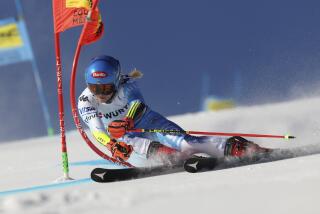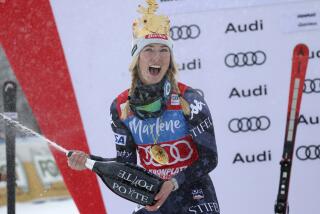THE OLYMPICS : WINTER GAMES AT ALBERTVILLE : Swiss Have Near-Empty Feeling : Skiing: Once dominant in world competition, they have won only a bronze medal in Alpine events going into today’s slalom.
- Share via
LES MENUIRES, France — Where have you gone, Pirmin Zurbriggen? A nation turns its lonely eyes to you. . . .
That would be Switzerland, which, going into the last of the 10 Alpine skiing events in the 16th Winter Olympics, has been able to yodel up only one medal, and a bronze at that.
It’s quite a comedown for a proud little country that as recently as the 1987 World Alpine Ski Championships won eight of the 10 available gold medals and 14 medals overall.
Swiss prospects for gold are somewhat dicey in today’s slalom as Italy’s Alberto Tomba tries to achieve his double-double--winning the same two events in successive Winter Games. Paul Accola, who leads the World Cup overall standings but has been disappointing in the Olympics, represents one last chance to salvage a fraction of Switzerland’s lost glory on the slopes.
Accola, who just turned 25, finished fourth behind gold medalist Tomba in Tuesday’s giant slalom and has the talent to spoil the Italian’s bid today.
Otherwise, except for Steve Locher’s bronze medal in the Alpine combined, the top Swiss men’s finishes have been Martin Hangl’s sixth in the super-G and Franz Heinzer’s sixth in the downhill. And aside from Chantal Bournissen’s fourth in the combined, the women have fared even worse. Their best places in each race were Vreni Schneider’s seventh in the slalom, Zoe Haas’ 10th in the super-G, Heidi Zurbriggen’s 10th in the downhill and Corinne Rey Bellet’s 17th in the giant slalom.
It sounds like a rundown of U.S. results in previous Winter Olympics and World Championships.
This time, however, Americans are outdoing the Swiss, with Hilary Lindh and Diann Roffe having taken silver medals in the women’s downhill and giant slalom.
Traditionally, the main battles of the Alpine wars have been fought between the Swiss and the Austrians, those two prime ski-industrial powers, with the Germans, French, Italians, Swedes, Norwegians, Americans and Canadians winning an occasional skirmish or two--or otherwise advancing on the strength of one outstanding individual.
But the Swiss and the Austrians have always had depth. One racer goes down with an injury or misses a slalom gate, and three more just as good move into the breach. Past Winter Olympics and World Championships have generally been “won” by one nation or the other after a string of take-no-prisoners confrontations.
At Val d’Isere and Meribel, the Austrians have held up their end of the fight, but the Swiss have been in full retreat and perhaps are fighting a rear-guard action today.
In their place, a flock of nations have fluttered down to pick off gold medals: Canada, with Kerrin Lee-Gartner in the women’s downhill; Sweden, with Pernilla Wiberg in the women’s giant slalom; Norway, with Kjetil Andre Aamodt in the men’s super-G, and Italy, with Deborah Compagnoni in the women’s super-G, Josef Polig in the men’s Alpine combined, and of course, Tomba.
Vienna will have at least three Austrian gold medals to celebrate--Patrick Ortlieb’s in the men’s downhill and Petra Kronberger’s pair in the women’s slalom and Alpine combined. In addition, Guenther Mader took a bronze in the men’s downhill; Veronika Wallinger got a bronze in the women’s downhill, and Anita Wachter grabbed a pair of silvers, in the women’s giant slalom and Alpine combined.
If Tomba wins today, the Italians will one-up the Austrians and leave the Savoy with four gold medals, which should keep the vino flowing from Milan to Florence and all the way to the Eternal City, at least through the weekend.
More to Read
Go beyond the scoreboard
Get the latest on L.A.'s teams in the daily Sports Report newsletter.
You may occasionally receive promotional content from the Los Angeles Times.






